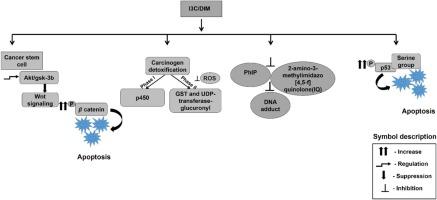Phytochemistry Letters ( IF 1.3 ) Pub Date : 2020-11-09 , DOI: 10.1016/j.phytol.2020.09.024 Alka Ashok Singh , Maheshkumar Prakash Patil , Min-Jae Kang , Irvine Niyonizigiye , Gun-Do Kim

|
Indole-3-carbinol (I3C) is a plant-derived phytochemical produced when raw cruciferous vegetables are chopped, and their plant cells are damaged. I3C is an orally bioactive compound formed upon the hydrolysis of glucosinolate by the plant enzyme myrosinase. Cruciferous vegetables belong to the Brassicaceae family and include many genera and species with potential biomedical applications. I3C is more abundant in certain cruciferous vegetables, such as broccoli, cabbage, green peas, cauliflower, and brussels sprouts, and has multiple biological activities, including antimicrobial, antioxidant, antiviral, anti-inflammatory, and anti-cancer activities. Most recent studies indicate that regular consumption of I3C-containing vegetables decreases the rate of various types of cancer. This review focuses on the general biomedical applications of I3C and its role in human wellness.
中文翻译:

吲哚-3-甲醇的生物医学应用:综述
吲哚-3-甲醇(I3C)是一种植物来源的植物化学物质,是将切碎的十字花科蔬菜切碎并破坏其植物细胞后产生的。I3C是一种通过植物酶黑芥子酶水解芥子油苷而形成的口服生物活性化合物。十字花科蔬菜属于十字花科,包括许多具有潜在生物医学应用的属和种。I3C在某些十字花科蔬菜中含量较高,例如西兰花,卷心菜,绿豌豆,花椰菜和球芽甘蓝,并且具有多种生物活性,包括抗微生物,抗氧化剂,抗病毒,抗炎和抗癌活性。最新研究表明,经常食用含I3C的蔬菜会降低各种癌症的发病率。






























 京公网安备 11010802027423号
京公网安备 11010802027423号